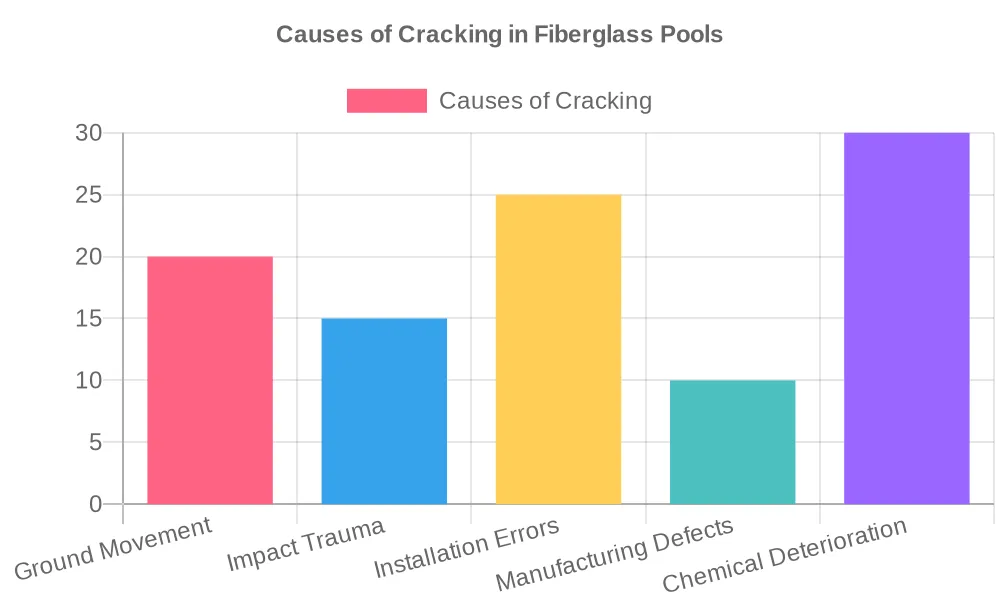
Answering the question; Do Fiberglass Pools Easily Crack?

The backyard pool is the centerpiece of many dream homes, a symbol of leisure and a haven for relaxation. Among the various types of pools available, fiberglass pools have steadily gained popularity for their sleek appearance and low maintenance requirements. But, as with any significant investment, potential pool owners often find themselves pondering one critical question: “Do fiberglass pools easily crack?” This article aims to go deep into the heart of this query, providing a comprehensive understanding of fiberglass pools and their resilience to cracking.

Latest


Are Fiberglass Pools Good for Cold Climates?

How Do You Properly Clean a Fiberglass Pool in 2024?
Categories
Understanding Fiberglass Pools And Whether They Carck Easily
Fiberglass pools are renowned for their durability and ease of maintenance. Crafted from a mold, these pools are a single-piece construction made of fiberglass-reinforced plastic. This construction method is a stark contrast to traditional concrete or vinyl liner pools. The key to a fiberglass pool’s strength lies in its flexibility, allowing it to withstand minor ground movements and pressure changes without cracking. It’s a bit like the difference between a rigid ceramic plate and a bendable plastic container; while the former might crack upon impact, the latter can absorb shocks without permanent damage.
The Resilience Against Cracking
To address the elephant in the room – do fiberglass pools easily crack? The answer isn’t a simple yes or no. Generally, fiberglass is highly resistant to cracking under normal conditions. It’s important to note that “normal conditions” play a pivotal role here. The manufacturing process of fiberglass pools involves coating the fibers with a gelcoat, which not only gives the pool a smooth, attractive finish but also adds to its structural integrity. This gelcoat layer is considerably thicker than regular paint, making it resilient to everyday wear and tear.
However, this doesn’t mean fiberglass pools are indestructible. Like any material, they have their limits. Exceeding these limits, either through extreme impact or poor installation, can lead to cracks. It’s similar to how a sturdy tree can withstand strong winds but might succumb to an overwhelming storm. In the case of fiberglass pools, such extreme scenarios are rare but possible, in terms of the shell getting a crack.
Factors Influencing Durability
Several factors play into the durability and potential for cracking in fiberglass pools. These include:
- Quality of Construction: The caliber of the fiberglass and the precision of the manufacturing process significantly impact the pool’s susceptibility to cracking. Higher-quality pools, built with meticulous attention to detail, are less likely to develop cracks.
- Installation Process: Proper installation is crucial. An uneven foundation or hasty installation can predispose the pool to stress points, leading to cracks over time.
- Environmental Conditions: External factors such as soil type, weather patterns, and ground movement in the pool area also play a role. For instance, areas with frequent soil shifting might pose a greater risk for pool cracking.
- Maintenance: Regular maintenance, like keeping the chemical balance of the water in check and promptly addressing minor damages, helps in preserving the pool’s condition and prevent cracks.
Causes of Cracking and Preventive Measures
Deciphering the Causes Behind Fiberglass Pool Cracks
While fiberglass pools are notably durable, certain conditions can predispose them to cracking. It’s essential to identify these potential causes to better understand how to maintain and care for your pool:
- Ground Movement: Similar to the shifting foundation of a house, pools can be affected by the earth they rest upon. Soil changes, common in earthquake-prone or high-precipitation areas, can cause the pool to shift or settle unevenly, which may result in stress cracks.
- Impact Trauma: Fiberglass is robust, but not indestructible. A substantial impact, such as from a large falling branch, can cause cracks. It’s similar to a durable plastic container that can withstand minor falls but cracks under a heavy blow.
- Installation Errors: An improperly installed fiberglass pool can develop stress points, leading to cracks. Factors like uneven ground preparation, mishandling of the pool shell, or insufficient support can all contribute to this problem.
- Manufacturing Defects: Although rare, flaws in the manufacturing process can leave the pool with weak areas prone to cracking over time.
- Chemical Deterioration: Consistent chemical imbalance in pool water can erode the gelcoat, making the fiberglass more susceptible to cracking. High chlorine levels, for example, can weaken the pool’s structural integrity over time.
Proactive Maintenance to Prevent Cracking
To maintain the integrity of a fiberglass pool and prevent cracking, consider the following proactive strategies:
- Expert Installation: Ensure that your pool is installed by qualified professionals. This includes thorough site evaluation, proper ground preparation, and careful handling and placement of the pool shell.
- Routine Inspections: Conduct regular inspections for early signs of wear or stress, such as minor cracks, discoloration, or textural changes on the pool surface.
- Balanced Water Chemistry: Regularly test and adjust the pool water’s pH, alkalinity, and chlorine levels to preserve the gelcoat and prevent surface damage.
- Environmental Awareness: Pay attention to the surrounding landscape and environmental factors. Avoid planting large trees nearby to prevent root interference, and implement effective drainage systems in areas with heavy rainfall.
- Timely Repairs: Address any detected damage, especially cracks, as soon as possible. Early intervention can prevent small issues from escalating into major problems.
Repair Solutions and Final Verdict on Durability
Addressing Fiberglass Pools With Any Crack
Even with the best care and maintenance, cracks might occasionally occur in fiberglass pools. The good news is that these cracks are often repairable, and the process can be straightforward if addressed promptly:
- Surface Cracks: For minor, superficial cracks, a gelcoat repair kit can often do the job. These kits are designed specifically for fiberglass and can be matched to the color of your pool for a seamless fix.
- Deeper Cracks: More significant cracks may require professional intervention. This involves grinding out the cracked area and applying new layers of fiberglass mat and resin, followed by a new gelcoat application.
- Structural Repairs: In rare cases where the crack affects the pool’s structure, a comprehensive repair approach is needed. This might include reinforcing the affected area from beneath and a complete resurfacing of the pool.
- Regular Maintenance Post-Repair: After any repair, maintaining the correct chemical balance and regular inspections are crucial to prevent future issues.
The Overall Verdict on Fiberglass Pool Durability
Having explored the aspects of fiberglass pool construction, the potential for cracking, preventive measures, and repair solutions, the final verdict on their durability is overwhelmingly positive. Fiberglass pools, with their flexible yet robust construction, are designed to withstand the rigors of everyday use and environmental factors.
Key Takeaways:
- Longevity: With proper care and maintenance, a high-quality fiberglass pool can last for decades.
- Flexibility: The inherent flexibility of fiberglass makes it less prone to cracking compared to more rigid materials like concrete.
- Ease of Repair: When cracks do occur, they are generally more manageable to repair than those in concrete pools.
- Cost-Effectiveness: Over the long term, the durability and low maintenance requirements of fiberglass pools can make them a cost-effective option.
Conclusion
In conclusion, while no pool type is entirely immune to damage, fiberglass pools stand out for their resilience and ease of maintenance. The likelihood of a fiberglass pool cracking is relatively low under normal conditions, and when combined with proper installation, regular maintenance, and timely repairs, these pools are an excellent long-term investment for any homeowner.
Latest

How Do I Know if My Pool is Fiberglass?

Are Fiberglass Pools Good for Cold Climates?

How Do You Properly Clean a Fiberglass Pool in 2024?
Categories
YOU'RE NOT IN THIS ALONE
We are with you every splash of the way
Need a pool fix or looking for an upgrade? We’re just one click away to help with all your pool needs.

